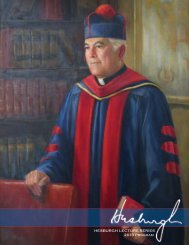HESBURGH LECTURE SERIES 2012 Program - Alumni Association ...
HESBURGH LECTURE SERIES 2012 Program - Alumni Association ...
HESBURGH LECTURE SERIES 2012 Program - Alumni Association ...
You also want an ePaper? Increase the reach of your titles
YUMPU automatically turns print PDFs into web optimized ePapers that Google loves.
Mike Crant, Ph.D., M.B.A.<br />
Professor and Chair, Management<br />
Biography<br />
Mike Crant is chair of the Department of Management in the Mendoza College of Business. A<br />
member of the faculty since 1990, he conducts research on proactive personality and behavior<br />
at work. Crant is one of the creators of the proactive personality scale, the most frequently<br />
used measure of proactivity in organization literature. His recent work studies the frequency<br />
and impact of proactive behaviors in Asian cultures, where proactivity has traditionally been<br />
Categories<br />
frowned upon. Crant teaches courses in management, leadership, teams, and decision making<br />
to undergraduate, M.B.A. and Executive M.B.A. students. A winner of multiple teaching Business<br />
awards, Crant has won three Kaneb Teaching Awards for effective undergraduate teaching<br />
and was selected as the outstanding professor by the Chicago EMBA Class of 2007. He has<br />
conducted numerous executive development seminars for companies worldwide, including<br />
Bayer, HSBC, LANXESS, Siemens, Donnelly, the Far Eastern Group, and Toro. Crant earned B.S., B.A. and M.B.A. degrees from<br />
the University of Florida and a Ph.D. in organizational behavior from the University of North Carolina at Chapel Hill.<br />
Lectures<br />
How to Be a More Effective Leader<br />
Leadership is about getting things done through people. This lecture will explore the question, “What makes a great leader and<br />
how can I become one?” The lecturer will draw from best practices of highly effective leaders and from large studies of followers<br />
in order to arrive at practical answers to this question.<br />
Making Better Decisions at Work<br />
The essence of managerial work is making decisions, yet people spend surprisingly little time thinking about the decision-making<br />
process. How do people actually make decisions? What types of factors cause leaders to make poor decisions? What about the<br />
role of intuition? When can we trust our gut?<br />
28 The Hesburgh Lecture Series, <strong>2012</strong> <strong>Program</strong>



